Archives 2015
“Each Generation Must Re-Invent Theatre”
János Regős: In the book you write that by the very beginning you and Grotowski were like two moles under the ground, no one knew anything about you, you didn’t know anything about theatre but something was born between you there in the railway station restaurant. You talked about everything, about profession, parents, countries where you lived.[*]
Eugenio Barba: The book tells a story which happened such a long time ago that only people of my generation are able to recall, recall the conditions of life at that time. One of the reasons why we read books about theatre art is that we are able to get only very superficial information of the past as we were not living in that historical time. And so, all the new answers escape us. In the early ’60s the world was divided into two blocks: the so called socialistic “progressive” block and the capitalist “reactionary” block. They were threatening each other with atomic war. Information about socialist countries was very sparse. If you were a left winged communist person you would hear the tendency that socialists live in a paradise. So information was very sparse. Even the books! If you wanted to know something you had to go to the library to find something in the archives. The flood, the deluge of information that surrounds us today was unimaginable at that time. So, if somebody found a book and this book said something, you went and discussed about this book. This was very normal at that time. It’s not exceptional that with Grotowski we were discussing about books. They were discussions about “white stones”. We believed in that they take us towards freedom. Because this was what a young person lived for. Freedom of thinking, imagining, and find the time to be able to analyze it. So, when I decided to go to Poland it was because I was left winged, I imagined that in this progressive country which at that moment was blooming with culture: the translations of their authors, their graphic artists, the films, the music, the composers…In the early sixties Poland was really “present” in the cultural/artistic awareness of Europe. So I went there. A few months later I was very disappointed by the socialist world but I was grateful to Poland because I have become immune against ideologies. The problem remained: I was communist because I was against injustice. After Poland I was no longer a communist because injustice there continued to exist. How to solve this paradox? The theater was the solution. The theatre for me was always politics by other means. Remember Clausewitz’s definition of war: war is an expression of politics by other means. But this politics should not be recognizable out of ideologies. When I met Grotowski he was a member of the Party. Ludwig Flaszen, his closest collaborator was also, everybody was a member of the Party at that time. I was also ready to be a member of the Party if this permitted me to do theatre and continue it. This is one of the things that is very difficult to understand for somebody who did not live in that country then. One had to be very astute to protect the truth, the aspirations. And it was out of this feeling of injustice that I started to like Grotowski and his actors. Because I found it unjust that he, his actors, and all the people in Poland, all those living in the socialist camp, couldn’t get passports. So I started to fight for this theatre. But at that time it was not the theatre for me. I liked these people very much because I found them naive, extremely coherent, and even rather courageous. When I left Poland I wanted to do REAL theatre. I went into all the traditional theatres in Oslo and I couldn’t get a job there. So I had to start my own theatre. So, what we are going to see here in three weeks (Odin’s performance at MITEM – J. R.) is the result of the canopy of communism, the work of a director rejected from the real traditional theatre, who somehow still learned it that the theatre can be a burning place of freedom. These beautiful words presuppose that we have to work fourteen hours a day like the protruding soldier conquering one meter at a time of the territory. And this meter is one spectator at a time! And you conquer spectators by the quality, by the depth, by transcending yourself in work.
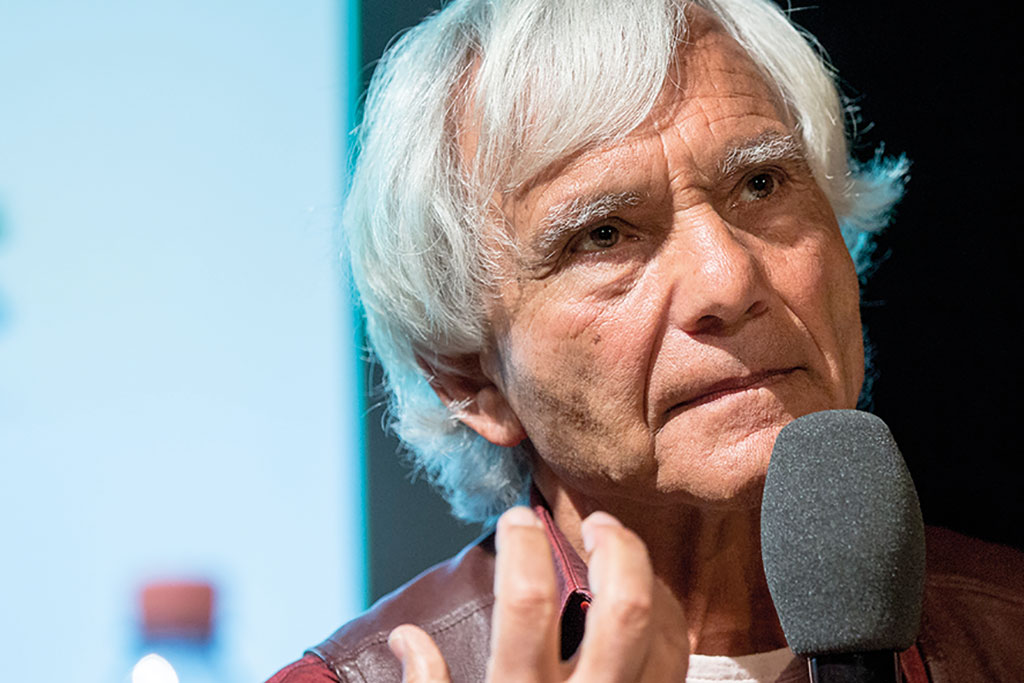
In Vienna in 1985 I conquered two meters, two spectators: one father and one son. The father was called Pál. He appeared there; he was from Budapest, had seen our performances and invited us to Budapest. Since 1985 his son, who is translating me, and the father have made Hungary a member of our family, “Odinland”. Of course this applause goes to Pál. I have to tell you something in the end: I wrote this book because I wanted a young person like I was at that time, to help understand Grotowski with the same degree of naivety and disorientation. What in a way disturbs me today about Grotowski, who was totally unknown at that time, is the theological thinking in relation to him. I know it is a small and seemingly technical detail, but it is important to mention his capacity to deal with the authorities. This should be also important to us! I wanted to write treaties on guerrillas. Analyses I was making. The terminology he was using although it was prohibited. Find Marxist definitions. It was impossible to find Marxist definition to that work. This was that I wanted to transmit in a very practical concrete form: how to defend your own means, to start and maintain your theatre.
J. R.: In the book we read much about the history of your friendship. I have one strong memory in mind about you and Grotowski. It happened in the early ’80s in Liege, Belgium. I was there at a festival and the two of you together were holding a lecture. The cafe was packed with people who wanted to hear the two famous masters at one table. I was sitting under the table (there was no other place) where you were talking, and was shocked in way. I had thought that Grotowski and Barba were close friends in a spirit of concord. Instead, I experienced a very sharp debate between you. I, as a naive young man, was very surprised. Your deep friendship was characterized by both controversies and consensuses. All this appears clearly in your book in a stunningly exciting way. How could you fit together the two in your relationship?
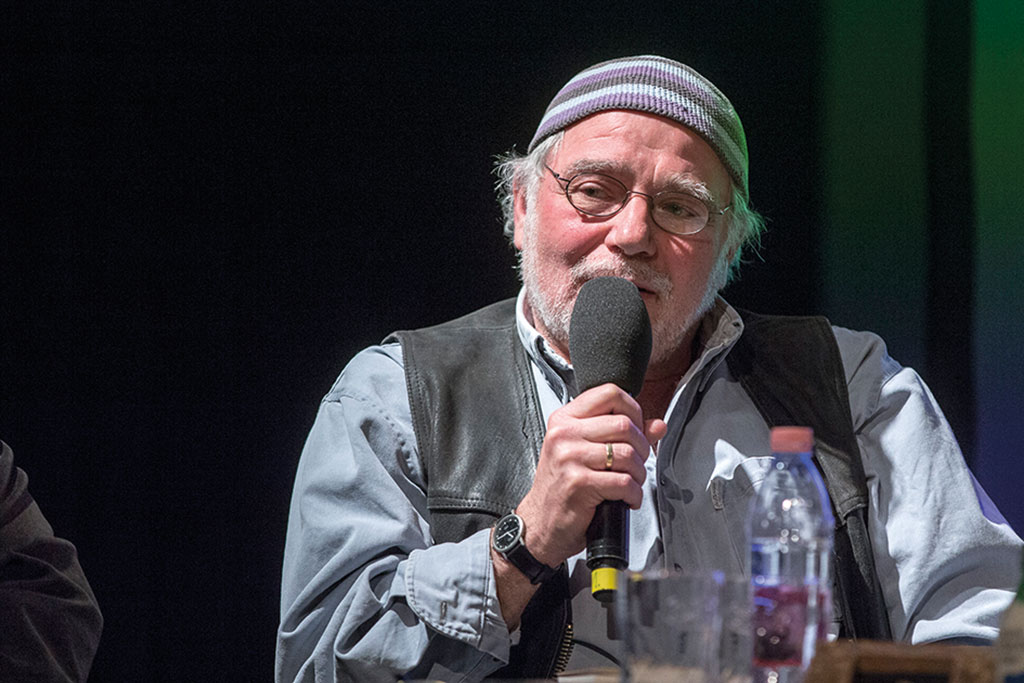
E. B.: When I say that Grotowski is my master it is because he taught me a very important thing. Not to assume what people think you are. Grotowski changed very much after he became famous. He assumed the role of the wise man. Think of the facts: he is only 32 years old, has been doing professional theatre only for 8 years and one day to another he becomes a prophet.
J. R.: Thanks to you in a way.
E. B.: Everybody expects him to behave like a prophet and to speak like a prophet and to do performances like a prophet. What did Grotowski do? He decides not to do theatre performances anymore. For me it was very-very important to see, to follow and to understand that the only possibility for remaining very close to what you were when you were young was to remain together with your actors in the same primitive conditions of the beginning, of the origins. And for me Holstebro, this small Danish town which accepted me and my unknown actors in sixty-six, was my very important sanatorium where I can be protected from this effervescent atmosphere which surrounds fame. We discussed everything when we were in Opole. By all of his decisions I asked why he was taking that decision. And he answered me very sincerely. When he became famous I didn’t ask him any more about his decisions. You can ask me why. We inspired and were very close to each other. Because in our flesh, in our body remained the memory of these three years. His theatre in Opole was closed, was shut by the Party in those days. It was because a secretary in a bigger town, in Wroclaw thought “aha, we want to compete with Warsaw in culture” and got the idea to invite Grotowski and his company in Wroclaw. When I tell you that I didn’t ask him anymore it was because I felt that he would not be answering me. He would answer me diplomatically. And I didn’t want it. Therefore I accepted what he was doing.
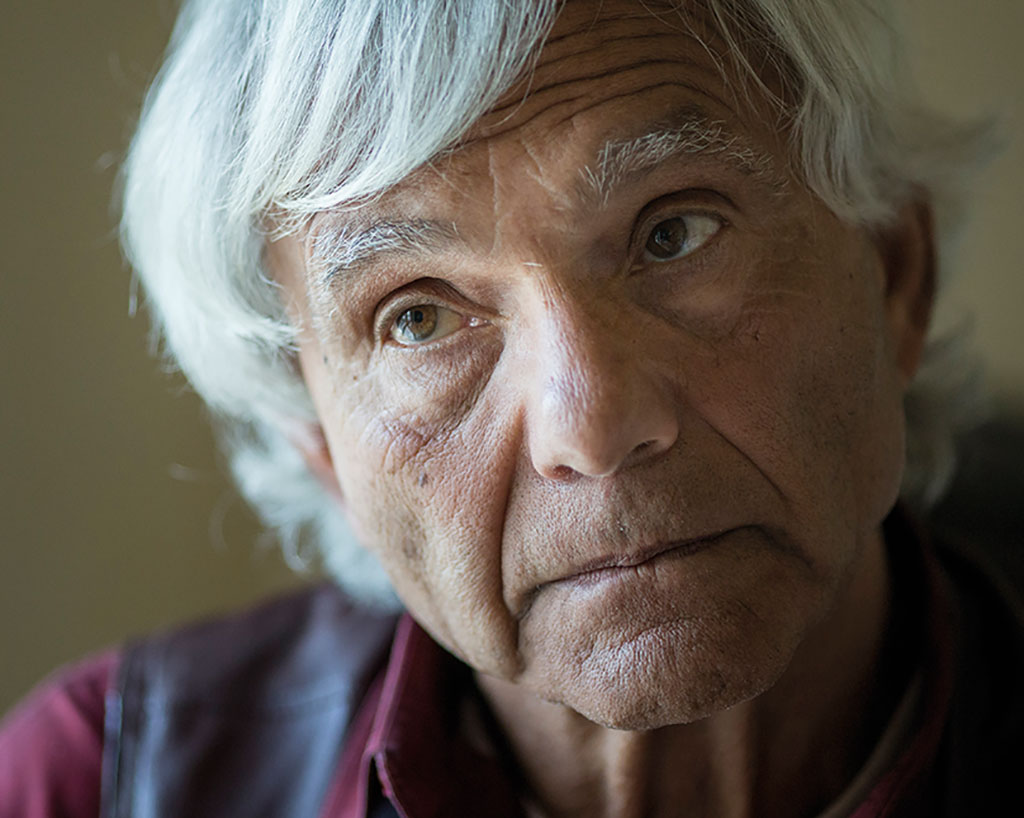
Give me two more minutes yet. I want to speak of Hungary in the name of Grotowski beause it was Hungary that paved the way for Grotowski to international fame. In 1962 a Hungian theatrologist called Ferenc Honti arrived in Opole. He saw Grotowski’s performance and then he said to him ’Well, this is a very formalist performance. We in Hungary are against these formalist performances. In order to protect our young directors and actors against formalism we have a series of books which describe formalist performances. So I propose that you would write a book about Grotowski so we can protect, safeguard our young artists by reading about that what not to do.’ Grotowski said, ‘of course I would do this’. Anyway it was fantastic: somebody was asking for a book about a totally unknown theatre. Then he came to me: ’You’ll write the book.’ I’ve never written a book before. But what love makes!(?) I started writing this book, even in French, the language of the troubadours. It was called: In Search of the Lost Theatre. I sent it to Ferenc Hont and it was published in Hungary. My mother translated it into Italian. It was also published in Italy. But I had to type and type again the French manuscript because we had just that carbon paper to make copies. It was given to all the people who shaped the face of new contemporary theatre in Europe. So, thanks to Ferenc Hont, people could get a description of what Grotowski was doing.
Attila Vidnyánszky: Do we need to reinvent the theatre? Or it is good as it is working now?
E. B.: Each generation must reinvent. Not the theatre in its superficial structure, but in the deeper meaning theatre can have for the individual artist and for the spectator in its community. The theatre is not a value in itself. Theatre is a profession which was founded about five hundred years ago and was a commercial enterprise. Its purpose was entertaining spectators. In the twentieth century a few strange, bizarre people started speaking about theatre not as a commercial enterprise but an artistic one and they invented a sort of metaphysics of theatre, something that went beyond the entertainment value. They spoke about ethics, about spiritual values, didactic, therapeutic values, etcetera. You know all of them from Stanislavsky to Grotowski. But the problem is that today, in this very moment, throughout the whole planet, there are at least one million performances a day. But most of them are still entertainment. So each generation can accept this or each one must invent a theatre which has a deep meaning for him/her or for other people. I would like to ask you for one minute silence. I’ve just received from Giuseppe Bonifati (a young Italian actor/director in residence by Odin) a message that Judith Malina /the co-director of The Living Theatre R.J./ died last night. I think that together with Grotowski, Julian Beck and Judith Malina the directors of The Living Theatre were the main creators of what we are today. So I ask one minute silence for ourselves and for the honour of our beginning…
A. V.: We know that at theatre companies that have worked together so long there are controversies, discordances, breakups, deaths… How have you been able to hold this fantastic company together for such a long time?
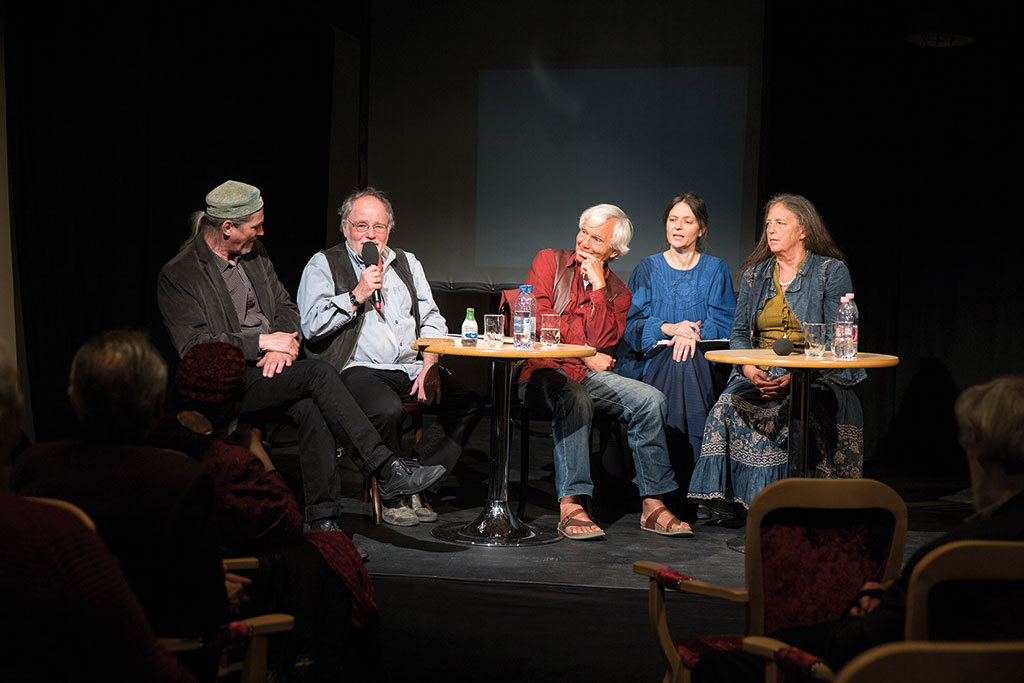
E. B.: I’ve been thinking myself about this because in the last ten years I was always asked this question. In the beginning each of us was asked different things and tried to answer them. I think that there are four very important factors we have managed: the main one is that from the very beginning I as a director felt the obligation to give salary to my actors. We were a group having no subsidies so I knew that I should give them a minimum. They should not think about money. The minimum – and, at the same time, I have to demand the maximum. So over these fifty years, our actors have received their salary at the end of the month. There were periods, though, when I couldn’t pay. Then I could see at once how a group was ready to disappear. Because when you are thirty-forty years old you have a family, have children – the rules of life dominate in your head. The second factor was that very early, after four-five years, I decided I wanted to keep my actors until I die. This seems very strange for a young director in his thirties. I want to follow them; they want to follow me until we die. I know very well why I am talking about this decision. And once again, it was Grotowski who taught me this. It was when Grotowski decided not to do any more performances and he left all his actors and began working with a group of young people. I thought very much about this. I know that this is the pattern in theatre history. Stanislavsky did the same with his studio. Copeau did the same in Bourgogne. Everybody thinks that Grotowski is my master. It is true and not true at all because I’ve learned my craft together with my young actors. They have been really teaching me how to become a director with all the errors, experiences, all the new inspirations. And, first of all, how they were able to destroy all the prejudices in me about male actors, female actors. It was very important: go against the nature of theatre, of the profession where relationships are always very short, just a few years and then people separate. This obliged me to do a lot of changes in my way of thinking about theatre and directing the group. Some of the actors wanted to leave and I said ‘no, you must remain here within the framework of Nordisk Teatrelaboratorium, not in the Odin Teatret. You can have your own group here with a different name, different identity. You don’t need to identify yourself with the Odin if you don’t want to. But this is the place where you have been working and you have been grown. It belongs to you.’ So this is the second factor. The third factor is that in the very beginning Odin was an amateur theatre and we prepared our performances in a small school room. The only thing we had to invent was how to hang a rope. When I was travelling in Europe to spread information on Grotowski, I met a lot of people and I still kept contact with them, have become a sort of friends. Then they started to invite Odin because the only thing we needed were few benches, a small venue and the home of friends to sleep. So in the very beginning Odin was invited by friends. When we were doing performances these friends became very special spectators saying ‘I want you to come to my town, to my country!’ Most of them were theatre groups. Like your group in Beregovo (in Ukraine, Illyés Gyula Hungarian National Theatre, founded by Attila Vidnyánszky – J. R.) At that time I felt that I belonged to this constellation of people. When they came they said ‘Oh you are very expensive!’ I answer: ‘Yes, of course we need money. But first of all I want to test his/her capacity of making miracles.’ And these people with nothing, with no help from authorities, they could make miracles. They managed to convince theatre directors, traditional theatre directors, festivals to get money to invite us. If one makes the history of ISTA /International School of Theatre Anthropology – J. R./ one would learn that these international sessions which cost two-three hundred euro – were all organized by small groups operating without one cent. This is the power of love and fanaticism. So these people which I have to call the “secret”, the people of the Odin. They kept and protected the independence of the Odin. We were not depending on the fashions, on cultural politics, on the market because when we made a production we had fifteen, twenty places to go to where our friends invited us. And this managed our independence. The last five-six years it became very difficult because of the economical crisis in Europe and because of those many people who are now among the angels.
Julia Varley: But I want to answer in a different way. Of course, there are many answers. One of them is because we are a theatre laboratory. Eugenio has often used the image of Alexander the Great, of how he would win the battles as for he rode on two horses. So if the enemy went against one he was on the other. And the fact of being a theatre laboratory means to have different activities. For example it meant that one of the actors broke his leg and he can no longer perform that show we were able to start making a film. One of the examples, maybe, can explain a bit more. Once the director, Eugenio got very angry and left. It was during the rehearsal of the production The Ashes of Brecht. He was very-very angry. I even saw an axe in his hand and he went out of the room and left the theatre. One really had the feeling that he won’t come back. What did we do next morning? We did what we always do. We went into the room to do our training. We had something, an activity which meant that we have to meet again. And because we, actors continued to do what was our work I think we had the strength to call Eugenio back. And then we finished the performance.
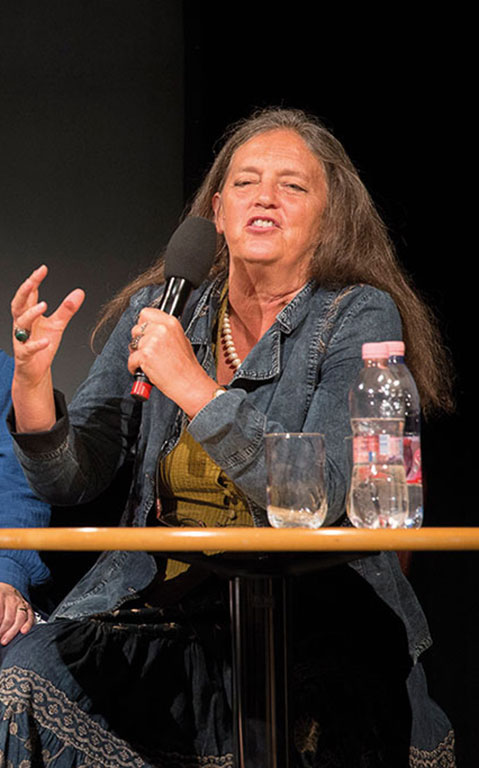
J. R.: I think the people here are very curious why Eugenio was so angry.
E. B.: I got angry with one of the founders of our theatre who behaved very irresponsible to my way. It happens sometimes that I don’t control myself. You may all know what it is to work every day, it is a routine, and it is not a sort of ecstasy. It is like fishing pearls. You are suffocating under the water and most of the times you get empty shells. After many years of work you need that everybody is aware that he/she has to contribute with something to what is going on there. Otherwise it is just a routine, just entropy, just sleeping. And if one of the actors forgets it for a moment then I really get angry. This was the case in that moment.
J. R.: Julia said that it happened only once in your fifty years’ history. Am I right?
J. V.: It happened once that I saw Eugenio leaving us and not coming back. But then he also did leave another time.
J. R.: The reason was the same?
J. V.: No. One of the other answers is that a theatre group always confront constrictions, difficulties that help us change. So we never rely on what we know but we always have to find something which we need to discover. And one time what Eugenio did, he left the group for one year. He left with the great intention of giving to the younger generation the power of decision. I belonged to the younger generation at that time. He left saying that the younger generation shall destroy the museum and create something new. So we had a terrible year trying to keep together the actors and doing the performances and then Eugenio came back and he gave the responsibility of the theatre to the eldest actor. So, all the younger generation had to take that. The other answer is that we always respect the work. The space, the room where we work …when we close the door … what is private problem or conflict must be left outside. What we know is that we have to protect the work that we do together. It means that each of us has to give the best. The Odin Teatret is the only place I know that would demand the best of me every day. And I think that is one of the reasons why the actors are still there despite the fact that Eugenio does get angry and speaks a lot.
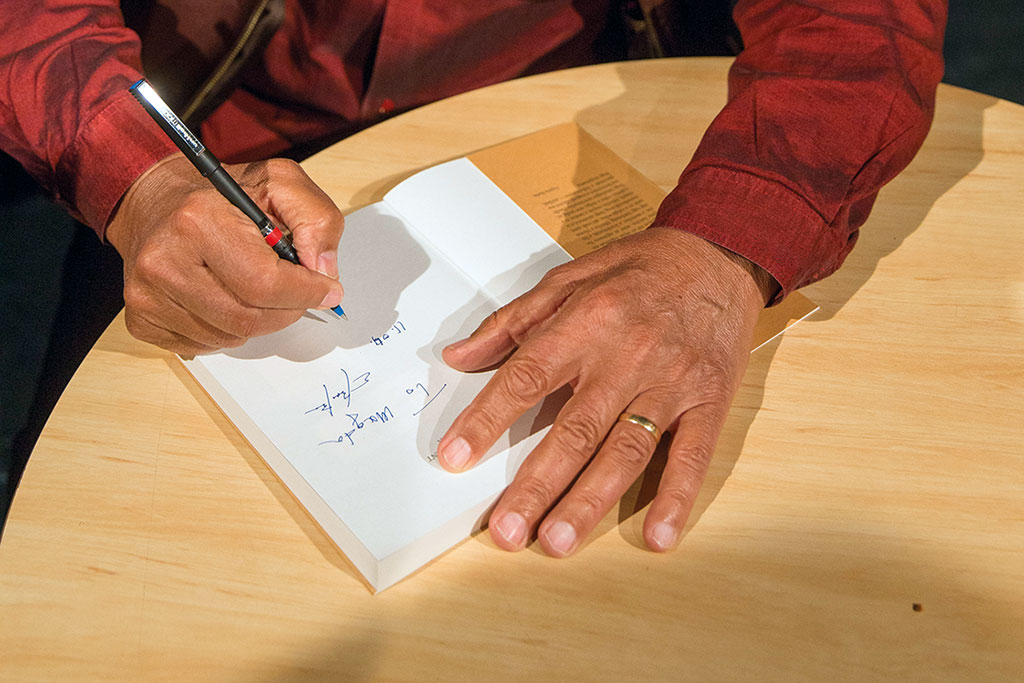
“Each Generation Must Re-Invent Theatre.”
A Roundtable Discussion with Eugenio Barba and Julia Varley
The presentation of Eugenio Barba’s book The Land of Ashes and Diamonds took place at the Nemzeti Színház (National Theatre) as a prologue to MITEM on 11th April, 2015. The participants at the accompanying roundtable were Eugenio Barba, the leader of Odin Theatre; Julia Varley, actress at Odin; András Pályi, peer-reviewer of the above volume; János Regős and Zsolt Szász as moderators and Nóra Durkó as interpreter. The present publication is composed of two extracts from the roundtable when E. Barba and J. Varley – in answering questions by János Regős and Attila Vidnyánszky, the director of the National Theatre sitting among the audience – expounded their views on the following topics: What did the freedom of thought and imagination mean to the generation of artists embarking on their career in the 1960s in Eastern and Western Europe? To what extent were the normative theatres of the time permeated by politics? Did J. Grotowski have a decisive role to play in E. Barba’s becoming a director and in the formation of the artistic creed of the theatre which E. Barba founded? How did the Odin continue to exist under the direction of E. Barba over fifty years? When and how did the relationship between this famous theatre laboratory in Holstebro and Hungarian theatrical life, theatre professionals, start and what makes it important even today? (This publication has relevance also because Odin and the National Theatre are preparing for a close partnership within the framework of a new EU project).
[*] MITEM prologue, 11 April, 2015. Presentation of Eugenio Barba’s book The Land of Ashes and Diamonds. Participants at the roundtable: Eugenio Barba, Julia Varley, János Regős, András Pályi, Zsolt Szász
(01 April 2015)











